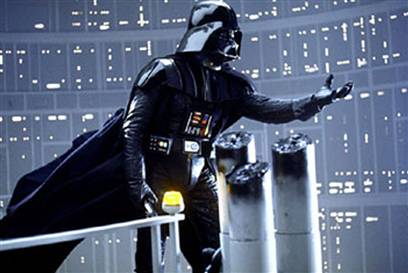What It Profits A Man
Last week I re-watched Star Wars. This looks like a good place to talk about it.
 My focus is primarily on Return of the Jedi. For although it is criticized as the weakest of the original trilogy, I find it the most profound. Like the other films, it’s an epic fight against evil and for life and freedom. But it’s also something more. It’s a fight for the soul.
My focus is primarily on Return of the Jedi. For although it is criticized as the weakest of the original trilogy, I find it the most profound. Like the other films, it’s an epic fight against evil and for life and freedom. But it’s also something more. It’s a fight for the soul.
To be fair, this began in The Empire Strikes Back, where our hero first met the temptation of the Dark Side and the villains plotted to turn and not merely to kill him. Darth Vader’s cat-and-mouse duel was as much a spiritual menace as a physical menace. Death was always in the cards, but it wasn’t the worst one to draw. That’s why Luke, when he was as beaten as he could be, chose it.
The Empire Strikes Back raised the specter of Luke Skywalker becoming Darth Vader, and Return of the Jedi invoked it as quickly as it possibly could. That’s why Luke entered the movie wearing all black and Force-choking guards. They were trying to remind us of someone, and it wasn’t even subtle. The father-son dynamic, limited and even sweet when the father was a dead Jedi Knight, turned into something more complicated and a whole lot darker. For an idea of how much darker, consider that it took real faith for Luke to insist that his father wouldn’t kill him for not going over to the Dark Side. (And you thought you had parental issues!)
But Vader was more than a walking, (mechanically) breathing warning of what happens when you lose yourself to the Dark Side. His soul was at stake, too. He struggled between good and evil, as his son did, and both exacerbated the other’s conflict – Vader trying to convince his son to join him in the Dark Side, Luke trying to convince his father to join him in the light.
There’s a dark intimacy to those scenes aboard the Death Star. Evil never seemed more personal than in the Emperor, or in the Dark Side threatening to consume both your father and your very self. What strikes me about the whole sequence is the sense that this is the greatest danger, this the worst thing. Death recedes before a greater evil. Nothing could be worse for Luke than to fall to the Dark Side.
And nothing cou ld be better for Darth Vader than to come back from it. Those words at the end – ‘I’ve got to save you.’ ‘You already have’ – show that even he knew the salvation that mattered most. It’s the spiritual danger and the spiritual triumph of Return of the Jedi that make me think of it as a profound film.
ld be better for Darth Vader than to come back from it. Those words at the end – ‘I’ve got to save you.’ ‘You already have’ – show that even he knew the salvation that mattered most. It’s the spiritual danger and the spiritual triumph of Return of the Jedi that make me think of it as a profound film.
I don’t think Return of the Jedi is an allegory or a metaphor or a Christian film. I’m not looking for God in Star Wars. Whatever I think watching the movie, I know the people who made it were often thinking something quite different. And it doesn’t diminish my enjoyment of Return of the Jedi as not only a fun movie, but also a heroic and even deep one.
Question time (this is traditional). What is your opinion of Return of the Jedi? Are there any movies, either good or bad, that you think are mislabeled as Christian? Yes, Your Honor, I’m leading the witness because frankly, I think some Christians are too free with that label.










































I’ve not thought too highly of Jedi. It’s the movie I watch when I really want to watch New Hope or Empire, but I’ve seen both of them too recently to savor a re-viewing.
For a moment I felt the force of your argument. I like it when someone can enrich something I haven’t put much stock in. It becomes a cool kind of sharing. So thanks!
If you want a good Christian / not Christian film, try Blue Like Jazz. Have you seen it? Steve Taylor of 80s Christian music fame really put something meaningful out there that works as a Christian film, but is very far from the traditional notion of what that is. To the point of offending some Christian folks, I don’t doubt. To the point they say it’s not a Christian film. I’m not explaining it well, but do give it a watch! I wish my friends had pointed me to it years ago.
I might have to watch that tonight. See what you’ve done?
Never heard of Blue Like Jazz. I’ll have to look it up.
It’s not hard for me to understand why people would prefer the earlier movies to Jedi. New Hope is a great ride, and Empire probably has the best-crafted story. Personally, I rank Jedi and Empire pretty close to each other. My least favorite of the trilogy is A New Hope, as it feels a bit uneven and most of the characters had their best moments in the later films.
I’ve always felt the same way about Return of the Jedi.
I don’t tend to watch many “Christian” labeled movies. Too often, the label also means low-quality or cheesy. I prefer a movie to speak for itself by it’s content. But I do enjoy movies that make you think and that a Christian perspective colors in ways the makers may not have intended. (Like The Great Waldo Pepper – how lost he is and how differently would the story had gone had he not been trying to fill the void in his heart with earthly things.)
I think perhaps the term “Christian” is thrown around too freely, Shannon. There seems to be confusion between “clean” and “Christian.” I think Christians can make movies (or write books) with high moral value, but that still doesn’t qualify them as Christian.
But I suppose that opens up the age old debate: what exactly makes a story “Christian”?
As far as the Star Wars movies are concerned, I saw the first one and actually wondered if the writer wasn’t a Christian (I knew nothing about him). I thought the suggestion that Darth Vader was Luke’s father in Empire Strikes Back was misdirection. Oh, I was disappointed. No way could Luke be a Christ figure with Satan as his father. 😉
Yes, I was looking for symbolism wherever I could find it.
As far as the movies themselves, I’d have to say I was disappointed with each one after Empire, some only mildly so (Return of the Jedi), and some to a greater extent. In many ways I was sorry the second trilogy was made.
Becky
RotJ has always been my favorite. Always. I hate that I feel the need to duck when I admit it as if being emotionally draw to the climax of Luke’s tale makes me not a real fan, but I do. There is something in the final battle (and the score!) between father and son and then that moment where Luke is burning him upon the pyre that gets me every singe time. A bittersweet grief. Its the exact same reason why my favorite Pirates of the Caribbean film is the 3rd one as well (At Worlds End)… the son rescues the father but loses a relationship in the same moment as well. Its a bittersweet end.
And yes, Christians as so bleeding quick to snap up anything as theirs and put it on this pedestal a mile high… then they forget the flawed humans that made it are *gasp* flawed and they are humiliated and angry when they stumble and somehow feel personally hurt. We need to stop it. I think the craziest films I’ve seen raised up to ‘Christian’ is The Matrix (I used to work in a Christian bookstore and there was a book we got in one time entitled ‘finding God in The Matrix’… the logic was a really stretchy stretch let me tell you). Now there is some similarity in theme to be sure, and points to be made, but Matrix is gnostic if its anything at all.
Two words: Ewoks.
I loved Return of the Jedi too. A lot of factors went into that, including the situation where I watched it, but seeing good finally triumph was so rewarding. One of the most powerful plot devices is a character who gives self-sacrificing love without expecting anything in return. I also appreciated seeing Luke mature as a Jedi and a person. He rescues his friends, accepts the toughest mission, gives himself over to the enemy just so he can try to redeem him, and never compromises. (If you need any more reasons why Luke is cool, read this: http://www.tor.com/blogs/2014/02/you-all-forgot-that-luke-skywalker-is-a-bamf — excuse some language)
And, to stir up some controversy, one film legend I’d love to see labeled as Christian MORE OFTEN is Lord of the Rings. Sure, there’s no direct allegory and Tolkien didn’t want to be overt, but he definitely built Christian themes into the whole thing. And, unlike Star Wars, you don’t have to feel guilty for pulling parallels out of it.
That was an excellent article, Alex. Thanks for sharing it!